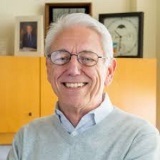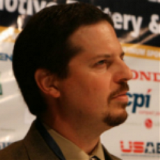Thursday, November 5, 2020 3:00 - 4:30 PM |
NEW DAY/TIME: TUT1: Solid State Batteries
Detailed Agenda
While recent efforts in developing solid-state batteries have focused on finding new electrolytes with ever-higher conductivity, at present, several types of solid electrolytes and active materials exhibit promising performance characteristics
to enable a step change in energy density and safety. The next phase in solid-state battery technology involves solid electrolyte-solid electrode integration and prototype testing. Of particular importance is the stability and kinetics
of the Li metal electrode interface. These and several other aspects will comprise this holistic perspective on cutting-edge solid-state battery development.
Jeffrey Sakamoto, PhD, Associate Professor, Mechanical Engineering, University of Michigan
INSTRUCTOR BIOGRAPHY:
 Jeffrey
Sakamoto, PhD, Associate Professor, Mechanical Engineering, University of Michigan
Jeffrey
Sakamoto, PhD, Associate Professor, Mechanical Engineering, University of Michigan
Wednesday, November 4, 2020 2:30 - 4:00 PM |
TUT2: Improving the Energy Density of Batteries with Silicon-Based Anodes
Detailed Agenda
This tutorial gives an overview on the benefits and challenges of using silicon-based anodes to improve the energy density of lithium-ion batteries.
Dee Strand, PhD, CSO, R&D, Wildcat Discovery Technologies Inc.
INSTRUCTOR BIOGRAPHY:
 Dee
Strand, PhD, CSO, R&D, Wildcat Discovery Technologies Inc.
Dee
Strand, PhD, CSO, R&D, Wildcat Discovery Technologies Inc.
Dr. Dee Strand is a Senior Scientist at Wildcat Discovery Technologies. Dr. Strand has over twenty years of experience in materials research, development, and commercialization, primarily in the areas of energy storage and electronic
applications. Prior to joining Wildcat in 2013, Dr. Strand served as a Research Fellow at Dow Chemical, where she was the technical lead in Dow Energy Materials, as well as the Principal Investigator on external research programs
with universities and national labs on battery materials. Dr. Strand also has extensive experience in patent analysis and technical due diligence of new technologies. Dr. Strand completed her PhD in Analytical Chemistry at the
University of Wisconsin-Madison, under the supervision of Professor John Schrag. Her PhD research focused on rheology and birefringence of polymeric solutions. Dr. Strand also holds a Master of Science degree in Chemistry from
the California Institute of Technology and a Bachelor of Science degree in Chemistry from North Dakota State University.
Wednesday, November 4, 2020 4:30 - 6:00 PM |
TUT3: Managing and Understanding the Risks of Li-Ion Battery Safety
Detailed Agenda
This tutorial provides insights regarding processes that lead to thermal runaway in Li-ion cells, why all thermal runaway processes are not the same and how thermal runaway can be better understood and managed. There are fundamental differences
between how cells respond to various stresses and, unfortunately, still too-common misunderstandings of the causes of thermal runaway. These misunderstandings can seriously complicate battery safety management. The tutorial continues to
provide the basis for a clearer understanding of cell-level processes that result in thermal runaway.
Brian M. Barnett, PhD, President, Battery Perspectives
INSTRUCTOR BIOGRAPHY:
 Brian
M. Barnett, PhD, President, Battery Perspectives
Brian
M. Barnett, PhD, President, Battery Perspectives
Dr. Brian Barnett founded Battery Perspectives, LLC which provides consulting services related to battery technology and battery safety. Dr. Barnett has extensive experience in assessment, development and commercialization of battery
technology. He is recognized as both a technical and industry expert related to batteries and an expert in battery safety and has directed a series of successful lab-based, highly multidisciplinary battery technology development
programs that resulted in technology licensing or sale.
Thursday, November 5, 2020 8:00 - 9:30 AM |
TUT4: Battery Safety and Abuse Tolerance Validation
Detailed Agenda
Batteries have become daily use components for many applications. New growing segments like EV and grid storage batteries extend the traditional ordinary battery applications. In the race for energy density, we shouldn’t forget the safety
– as an example, the Samsung Galaxi Note 7 battery safety case. Unfortunately, we face daily safety events with injuries and severe damage. The tutorial focuses on portable, stationary and automotive battery safety along the battery
cycle life (acceptance, testing, assembly, use, transportation and disposal). The training incorporates Shmuel De-Leon’s and other experiences on battery safety representing over 26 years of work in the field. The motivation behind
the training is to provide attendees with the knowledge needed to safely handle the batteries in their organization and to support reduction in safety events.
Shmuel De-Leon, CEO, Shmuel De-Leon Energy Ltd.
INSTRUCTOR BIOGRAPHY:
 Shmuel
De-Leon, CEO, Shmuel De-Leon Energy Ltd.
Shmuel
De-Leon, CEO, Shmuel De-Leon Energy Ltd.
Shmuel De-Leon, Founder and CEO of Shmuel De-Leon Energy Ltd., is a leading international expert in the business of energy storage. Prior to founding the company, for over 21 years, Shmuel held various positions as an energy storage,
electronic engineering, and quality control team manager. Shmuel holds a B.Sc. in Mechanical Engineering from Tel Aviv University, and an M.B.A. in Quality Control and Reliability Engineering from the Technion Institute in Haifa,
as well as an Electronic Technician's diploma.
Thursday, November 5, 2020 10:00 - 11:30 AM |
TUT5: The Rechargeable Battery Market: Value Chain and Main Trends 2019-2030
Detailed Agenda
This tutorial will present the +10-year automotive market forecasts from Avicenne and other analysts (micro|Hybrid|P-HEV|EV). Other coverage will include car makers’ strategies and advanced energy storage (advanced lead acid|NiMH|LIB).
Additionally, LIB design for P-HEV & EV markets (cylindrical, prismatic, pouch cells) and LIB cell, module & pack cost structure 2019-2030 will be discussed.
Michael L. Sanders, Senior Advisor, Energy, Avicenne
INSTRUCTOR BIOGRAPHY:
 Michael
L. Sanders, Senior Advisor, Energy, Avicenne
Michael
L. Sanders, Senior Advisor, Energy, Avicenne
Mike has significant energy storage materials value chain understanding with an emphasis on lithium ion batteries and systems with 13 years of market knowledge and relationships. Successful program leadership experience with significant
business growth in ventures and existing businesses with a proven track record leading mergers and acquisition team to enter the lithium ion battery materials market. He joined AVICENNE in May of 2016 as a Senior Advisor. Since
joining the AVICENNE team, Mike has been leading the US AVICENNE activity working with many clients holding strategy workshops, validation of growth opportunities, helping clients establish their growth plans in energy storage
and establishing M&A targets/diligence. Before joining AVICENNE, Mike had a very long career with DuPont, his most recent role was the Global Marketing Director – Energy Storage Venture where he developed significant
understanding and insights for the energy storage materials market, device manufacturing and systems while leading global marketing and customer interface efforts to establish programs to enter the $20B energy storage materials
market. Executed strategic and market planning for opportunity evaluation, research, choices and M&A activity for entry into rapidly growing new market. He has a degree in Chemistry from the University of Delaware and is a
member of the Society of Automotive Engineers and Electrochemical Society.
Thursday, November 5, 2020 12:00 - 1:30 PM |
TUT6: Materials for Next-Generation Batteries
Detailed Agenda
This tutorial will cover the materials and performance challenges for next-generation batteries for electric vehicles and the electricity grid. The needs and use cases for storage in these two applications will be analyzed, and the possibilities
of advanced lithium-ion, lithium-sulfur and multivalent batteries for vehicles will be presented. Lithium and magnesium anodes, wide electrochemical window electrolytes and high voltage cathodes will receive special attention. New discovery
approaches based on materials simulation and statistical learning will be discussed.
George Crabtree, PhD, Director, Joint Center for Energy Storage Research (JCESR), Argonne National Laboratory
INSTRUCTOR BIOGRAPHY:
 George
Crabtree, PhD, Director, Joint Center for Energy Storage Research (JCESR), Argonne National Laboratory
George
Crabtree, PhD, Director, Joint Center for Energy Storage Research (JCESR), Argonne National Laboratory
George Crabtree is Director of the Joint Center for Energy Storage (JCESR) at Argonne National Laboratory, and a Distinguished Professor of Physics, Electrical, and Mechanical Engineering at University of Illinois-Chicago (UIC). He
leads research on creating next-generation electricity storage technology beyond lithium-ion batteries. He has directed workshops for the Department of Energy on energy science and technology, is a member of the National Academy
of Sciences and has testified before the U.S. Congress on the hydrogen economy, on meeting sustainable energy challenges, on the prospects for next generation electrical energy storage, and on accelerating energy storage on the
electricity grid.
Thursday, November 5, 2020 2:00 - 3:30 PM |
TUT7: Battery Pack Engineering for xEVs
Detailed Agenda
This tutorial will give an overview of battery systems design. An overall product development process will be discussed for a typical system. Design aspects of each individual subsystem will be explored with cost impacts of different design
choices. Testing, validation and designing for safety will be other key areas of discussion.
Kevin Konecky, Director, Battery Systems, Fisker, Inc.
INSTRUCTOR BIOGRAPHY:
 Kevin
Konecky, Director, Battery Systems, Fisker, Inc.
Kevin
Konecky, Director, Battery Systems, Fisker, Inc.
Mr. Konecky brings over 20 years of xEV experience to his work, having worked on multiple complex designs for battery system development, charging system integration, and high-voltage powertrain integration. He is skilled in new product
design and development, product testing, product safety, integration of multiple sub-systems for vehicles, new product launches and has expanded his skillset beyond batteries into power electronics. His experience in batteries
includes multiple technologies (Li-ion, NiMH, UltraCapacitors, Lead-Acid). Mr. Konecky has worked for multiple OEM and Tier 1 battery suppliers (GM, Fisker, Byton, Cobasys, EnerDel, Lockheed Martin) and has a BS in Electrical Engineering
from Clarkson University (Potsdam, NY) and MS from Purdue (IUPUI - Indianapolis, IN).
Thursday, November 5, 2020 4:00 - 5:30 PM |
TUT8: Battery Data Science for Automotive Applications
Detailed Agenda
Topics to be covered:
- Overview of ML opportunities
- Data management
- Exploration and key features
- ML examples — materials discovery and cycle life prediction
Tal Sholklapper, CEO & Co-Founder, Voltaiq
Austin Sendek, PhD, Founder/CEO, Aionics, Inc.; Visiting Scholar, Stanford University
Christianna N Lininger, PhD, Application Engineer, Voltaiq Inc
INSTRUCTOR BIOGRAPHIES:
 Tal
Sholklapper, CEO & Co-Founder, Voltaiq
Tal
Sholklapper, CEO & Co-Founder, Voltaiq
Dr. Tal Sholklapper has an extensive record of success as a cleantech engineer and entrepreneur. Prior to founding Voltaiq, he worked as the lead engineer on a DOE ARPA-E funded project at the CUNY Energy Institute, developing an ultra
low-cost grid-scale battery. Before joining CUNY, Dr. Sholklapper co-founded Point Source Power, a low cost fuel-cell startup based on technology he developed while at Lawrence Berkeley National Laboratory and UC Berkeley, where
he also did his graduate work in Materials Science and Engineering. As a Materials Postdoctoral Fellow at LBNL, he successfully led the transfer of lab-scale technology to industry partners.
 Austin
Sendek, PhD, Founder/CEO, Aionics, Inc.; Visiting Scholar, Stanford University
Austin
Sendek, PhD, Founder/CEO, Aionics, Inc.; Visiting Scholar, Stanford University
Dr. Austin Sendek is the founder of Aionics, Inc., a provider of software and professional services for machine learning-accelerated materials design. In addition, Dr. Sendek is a Visiting Scholar in the Department of Materials Science
& Engineering at Stanford University and a guest lecturer in the Department of Mechanical Engineering at Columbia University. Due to his academic and entrepreneurial work, he was included on Forbes Magazine’s 30 Under
30 in Energy list in 2019. Dr. Sendek holds a Ph.D. in Applied Physics from Stanford University and a B.S. in Applied Physics from UC Davis.
 Christianna
N Lininger, PhD, Application Engineer, Voltaiq Inc
Christianna
N Lininger, PhD, Application Engineer, Voltaiq Inc
Dr. Christianna N. Lininger is the Associate Director of Applications Engineering at Voltaiq, the Battery Intelligence Software company that is accelerating commercial battery development in all commercial storage markets. She comes
to Voltaiq after completing her Ph.D. and M.S at Columbia University and completing her postdoctoral studies at University of California, Berkeley. Her research was focused on theoretical computational chemistry and physics-based
modeling for renewable energy technologies, focused primarily on the impact of mesoscale processes on the key performance metrics of Li-ion batteries. She studied the impacts of nano-sizing active material and the mesostructure
of electrode composite on battery performance, phase-change materials, low cost cathode alternatives, solution responses at electrified interfaces, and machine learning algorithms to model building energy usage. Now at Voltaiq,
she works closely with partners in industry developing commercial batteries as well as the Product and Analytics development efforts at Voltaiq.